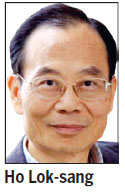HK's high land price policy: Myth or reality?
Updated: 2014-04-01 06:37
By Ho Lok-Sang(HK Edition)
|
|||||||
No one would disagree with the fact that Hong Kong's housing prices and land costs are high. From this valid observation, many have assumed Hong Kong has adopted a high land price policy, but this is more myth than reality.
According to government estimates, in fiscal year 2014-15, some 16.3 percent of government revenue will be derived from land sales. This amounts to about HK$70 billion. This is not a small amount, and the figure also varies a great deal, ranging from less than 10 percent to well over 20 percent.
Government revenue also depends on land values much more than these figures indicate. The rates at which the government collects are based on the Rating and Valuation Department's appraisal of rateable annual rental values of properties. In addition, the government also charges rents on properties whose leases expired in 1997 and on land leases granted since May 27, 1985. In addition, property developers' profits are very much tied to the performance of the real estate market. Property price increases contribute to the profits of developers, and these price increases are reflected in higher land prices. My own estimate, based on long-term data, is that a 1 percent increase in housing prices is associated with a 0.8 percent increase in government revenue, through greater proceeds in land sales, profit tax, rates, land re-zoning charges, land use conversion premiums, etc.
It is one thing to observe that government revenues are intimately related to land prices, and quite another to say the government is adopting a high land price policy. To establish the government has such a policy, one would have to demonstrate that it artificially restricts the supply of land to boost its own revenues. While this is plausible, the burden of proof is on those who believe there is such a policy to show it.

Everybody knows that Tung Chee-hwa, the first Chief Executive of Hong Kong, made a genuine attempt to boost the housing supply to 85,000 units per year, comprising 50,000 units of public rental housing or HOS housing, and 35,000 private housing units. Everybody also knows Chief Executive Leung Chun-ying has made increasing the housing supply his campaign platform and has been actively pursuing that goal. If there were a Chief Executive who had deliberately restricted the supply of land for development to boost land prices, it would have been Donald Tsang, under whose government land supply was unprecedentedly low. But can anyone demonstrate that Tsang restricted land supply to boost government revenue? Tsang believed in land sales through the Application List, claiming this was market driven.
The fact is: Many people in Hong Kong in recent years have woken up to the need for conservation. This newly acquired awareness has been translated into a greater difficulty in land use conversion and in development in general. Development is seen as profiteering, and developers are frowned upon as greedy people trying to exploit a "developers' hegemony". If anything, it is the opposition by some local people and by conservationists which has slowed down Hong Kong's development. Opposition to developing North East New Territories is a case in point. I for one cannot find evidence to substantiate the claim for a high-land price policy.
Actually, economists have little difficulty explaining Hong Kong's high land prices. The short supply is one thing, but the premium people place on Hong Kong is another. This includes its low tax regime, stable political and social climate, the civility of its people and low crime rate, strong rule of law, excellent infrastructure, and efficient public administration. Hong Kong is a global financial center with no capital controls, and ranks just after New York and London according to the Global Financial Centers Index released in March 2014. High land prices are the result of many factors, and most fundamentally reflect the inherent attractiveness of the place. High land prices cannot be sustained without the fundamentals which lend a city its attractiveness.
I would not be concerned about high land prices, as long as the government is supplying the necessary land for development whenever the social benefit outweighs the cost. Land prices should then be what the market dictates. A condition is that the banks must not supply easy credit for land speculation.
I would actually be worried about sudden reversals in land prices. This may signal a loss in Hong Kong's competitiveness, or a loss in confidence about Hong Kong's future. Recent cases of failures to attract tenders (at what was construed as reasonable market prices) and sharp declines in land prices where the tenders were admitted are more warning signals than welcome news. These are not only ominous signs of a possible reversal in our fiscal balance, they also suggest possible reversals in Hong Kong's economic fortunes. These signs need to be taken seriously.
The author is director of Center for Public Policy Studies at Lingnan University.
(HK Edition 04/01/2014 page9)